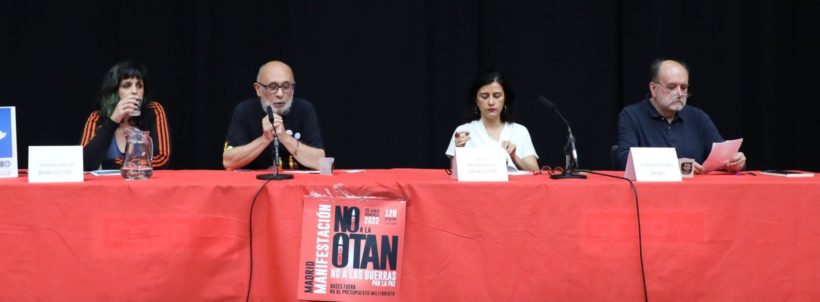Four days before the NATO summit in Madrid and by way of a “welcome”, the “Summit for Peace. NATO NO” prelude to the demonstration against NATO and the wars, which will be held on Sunday 26th and of which we will inform you promptly.
Pressenza attended two round tables of which we would like to share some notes as it is impossible to summarise everything that was discussed.
The first round table dedicated to “NATO, armed forces and military spending” was opened by Juan Carlos Rois, who investigates what Spain’s military spending is and what it is invested in. He explained that, although the Ministry of Defence declares an expenditure of around 10 billion euros, there is a great deal of diffused expenditure that depends on other ministries and institutions and which amounts to up to 39 billion euros. More than three times as much, from around 0.9 per cent of GDP to more than 3 per cent. It is an unsustainable and unnecessary expense in many of its items and, nevertheless, untouchable for the different parties that have alternated in government. Lovers of details and numbers can check the basis of these statements in the graphs published in alternativasnoviolentas.org.
He gave the floor to Quique Sánchez (IPB, International Peace Bureau) who went through different aspects of military spending that fuel tensions by making neighbouring or rival countries feel threatened. Peace can never be achieved by increasing the volume of arms, something that always ends in war sooner or later. Defence spending is justified to prevent invasion of one’s own territory, when purchases and preparation are clearly offensive. Military spending diverts resources from real needs such as health and education. NATO has a military budget 17 times that of Russia and only the UK has a budget close to that of China, so it is difficult to justify spending on the supposed threat of its hypothetical enemies.
Gemma Amorós, from the Centre Delàs, explained in detail how NATO’s internal functioning sucks up economic resources in areas such as the numerous demands for standardisation of equipment, R&D, continuous military exercises, etc. He also told us how Spain has participated in 42 military operations involved in controversial NATO invasions (Afghanistan, Iraq…) and the different American or joint-use NATO bases that serve as a gateway to US interference.
The second round table we attended dedicated to “The new lies of the old NATO with Ukraine in the background” was opened by Ainhoa Ruíz who presented the report recently published by the Centre Delàs: “NATO, building global insecurity”. She presented some of the report’s ideas that she found interesting. For example, that after the fall of the Berlin Wall, 51 walls have been built around the NATO world. It is not a world of liberal capitalism, where people have gained freedom of movement between countries, unlike capital that travels without restraint. He spoke of the concept of human security, not a militarily conceived security, but the security that comes from having one’s basic needs met. The extension of the concept of violence beyond the physical to different fields of human activity. Finally, he told us how NATO is devastating wherever it goes, as has happened in Iraq, Afghanistan and Libya, and, from this point of view, calling for NATO intervention in Ukraine to resolve things cannot be a good idea.
Carlos Taibo, professor of Political Science, specialist in Eastern European countries. Political Science professor Carlos Taibo, a specialist in Eastern European countries, after denouncing the invasion of Ukraine, said that it was necessary to establish how NATO also has a shared responsibility for having created the conditions for the conflict. This aspect is important, but impossible to expose publicly due to censorship in the disinformation media. He explained how, since the dissolution of the Soviet Union, there were clear opportunities for Russian integration with Western Europe, but how the various misunderstandings provoked by the US and NATO countries created, in a way, the Putin that has finally invaded Ukraine. This conflict has greatly strengthened NATO, which heralds more interference and conflict. Carlos warned of the advent of an eco-fascism that is fighting for natural resources and believes that there are “too many people” on the planet.
Finally, journalist Olga Rodríguez, who has been a reporter in different conflicts around the world, conveyed the truth of contact with the victims and disasters of war. She spoke of how at the borders where Ukrainian refugees are welcomed today, yesterday the victims of NATO’s wars in the Middle East were inhumanely mistreated. He went on to enumerate different incoherencies of NATO and Europe, now weakened and more dependent on the USA, which at the moment is looking for resources in states like Egypt, Saudi Arabia or Israel, which clearly violate human rights; how NATO had a policy of provocation in wanting to expand into Ukraine, how the warmongering discourse takes flight, encouraging the continuation and intensification of the war in Ukraine and even taking the same model to Taiwan to extend the conflict to China.
Well, much more was said, but we don’t want to bombard you, dear readers who have reached the end of the article, with so many ideas. We would just like to repeat some of Olga Rodríguez’s ideas, who told us how she has found among the victims of conflicts illiterate people, but who have a better understanding of geopolitics than the vast majority of us, because they have it engraved on their skin. We echo her final request, that hopefully one day she will stop being a war correspondent and become a peace correspondent.












